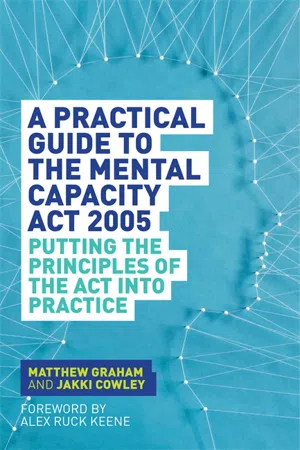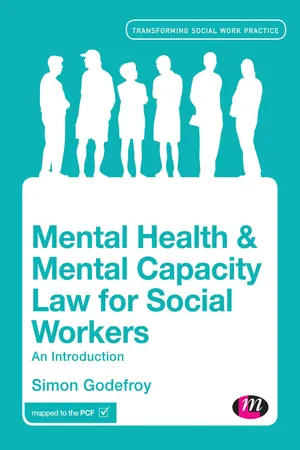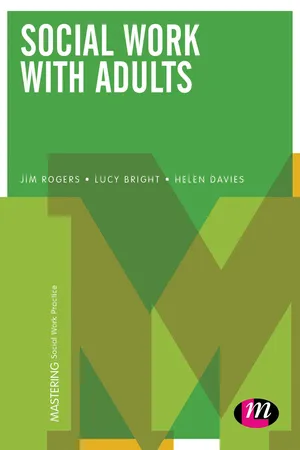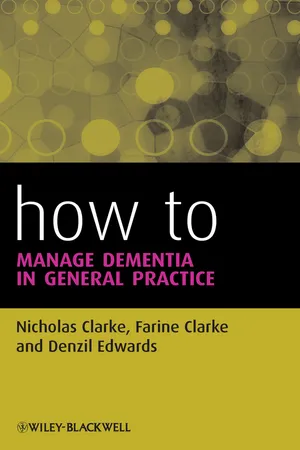Law
Deprivation of Liberty
Deprivation of liberty refers to the restriction or removal of an individual's freedom of movement and personal autonomy. This can occur through incarceration, detention, or involuntary confinement in a healthcare or residential setting. The concept is fundamental to human rights law and is subject to legal safeguards and protections to prevent arbitrary or unlawful deprivation of liberty.
Written by Perlego with AI-assistance
Related key terms
8 Key excerpts on "Deprivation of Liberty"
- eBook - ePub
A Practical Guide to the Mental Capacity Act 2005
Putting the Principles of the Act Into Practice
- Matthew Graham, Jakki Cowley(Authors)
- 2015(Publication Date)
- Jessica Kingsley Publishers(Publisher)
Nevertheless, having said this, restrictions or deprivations of liberty that do not adhere to the MCA and are not in P’s best interests will be unlawful. The key issue might be whether care staff actually know they are acting unlawfully in the provision of their care, or whether such actions have come about because of the culture of care in that organization.In very simplistic terms restriction of liberty means to limit and Deprivation of Liberty means to take away . These considerations will be useful when helping us to understand later in the chapter what might constitute a restriction or a Deprivation of Liberty.This chapter will first discuss ‘restriction of liberty’ within the context of choice and people’s self-determination and then the discussion will focus on Deprivation of Liberty, what this means in relation the DoLS – the Deprivation of Liberty safeguards.Restriction of libertyWhen reflecting upon restricting liberty we must first consider why we should never restrict people of their liberty, and when we do that we have very clear reasons for doing so. Yet again, we ask the question on what authority am I acting in this situation? Everyone has the freedom to make decisions, choices, express opinions and live their lives in the way they see fit, including what care people wish to accept or decline. The only time this liberty can be contained or removed is if law states so because of a risk of harm to self or others, or because of other parameters stated by law within the context of caring for others in their best interests. Some examples of this are:• Criminal justice – imprisonment, for example.• The Mental Health Act 1983 – detention for assessment and/or treatment.• The Deprivation of Liberty Safeguards – which this chapter discusses.• Parental responsibility under the Children Act 1989 – - eBook - ePub
Mental Health and Mental Capacity Law for Social Workers
An Introduction
- Simon Godefroy(Author)
- 2015(Publication Date)
- Learning Matters(Publisher)
However, when they introduced DOLS, the Government decided not to provide a statutory definition of a Deprivation of Liberty. Instead it stated that references to Deprivation of Liberty have the same meaning as Article 5(1) of the European Convention on Human Rights (MCA 2005, s64(5)). This means that there is no clear statutory definition (defined by Parliament in legislation) of what is a Deprivation of Liberty. Instead, it is up to the courts to interpret what the Convention means by Deprivation of Liberty, which means that what is considered to be Deprivation of Liberty can change over time.Restrictions on Liberty and Deprivation of Liberty
In order to understand if a person is likely to a deprived of their liberty, you need to understand what restrictions on their liberty are being imposed. As with Deprivation of Liberty, there is no definition of restrictions on liberty. There have been a number of cases since the introduction of DOLS which have placed differing emphasis on a range of restrictions in order to decide whether there is a Deprivation of Liberty or not. However, what is clear is that a Deprivation of Liberty occurs when the ‘intensity and degree’ of the restrictions placed on the person, who lacks capacity and is in a care home or hospital, build up to a point where the threshold of Deprivation of Liberty is crossed. Now this threshold of Deprivation of Liberty has changed over time (and is likely to continue to change in the absence of a statutory definition) but the fundamental building blocks, i.e. restrictions on liberty, basically remain the same. If we continue with the analogy of building blocks, restrictions can be bigger or smaller but when they are built on top of each other they can be tall enough to show that the threshold required for Deprivation of Liberty has been reached. This can be made up of a larger number of smaller blocks, or a smaller number of bigger blocks, or more often a combination of various sized blocks. If when you add up all the restrictions, the threshold of Deprivation of Liberty has not been reached, then there is no need for a legal authorisation. - eBook - ePub
- Jim Rogers, Lucy Bright, Helen Davies(Authors)
- 2015(Publication Date)
- Learning Matters(Publisher)
Code of Practice (Department of Health, 2008a) and by case law until the Cheshire West judgment.The wide national discrepancies in the use and application of the DOLS, as reported by the House of Lords and others, have a variety of causes. However, there must be some foundation for the discrepancy in this tension between those who see liberty as something that is lost incrementally through increased restrictions on an ongoing basis and those who see liberty as an absolute, which is immediately surrendered and compromised the moment an incapacitous person enters a 24-hour placement. The two approaches do not have to be mutually exclusive, but the writer would argue that the now blanket approach to identifying deprivation may have unintended consequences – namely, that by affording everyone the right of appeal, opportunities to recognise and encourage empowerment, supported decision making and choice within 24-hour care may be lost. By automatically assuming that an individual is deprived of their liberty, there is less room for recognising different models of care and treatment, and supporting those models that sit well within the ethos of the MCA.What is Liberty?
This is, of course, a question that is far too large and wide-ranging to answer in a social work textbook, but needs some reflection when considering concepts around Deprivation of Liberty.Philosophers, writers, anti-slavery campaigners and politicians have grappled with this question over the centuries. As human society has evolved, the variety of ways in which liberty can be perceived has also changed. For example, there is currently a debate around the ability of governments and/or businesses to spy on civilians by means of mass electronic surveillance, as highlighted by the Wikileaks whistleblower, Julian Assange. Privacy and liberty are now closely linked in a way that historical commentators would not have considered. John Stuart Mill wrote his famous treatise On Liberty - eBook - ePub
A Concise Guide to the Mental Capacity Act
Basic Principles in Practice
- Dr Tracey Ryan-Morgan(Author)
- 2021(Publication Date)
- Routledge(Publisher)
Chapter 3What do I need to know about depriving someone of their liberty? (With assistance from Karen Jackson, Consultant Solicitor)DOI: 10.4324/9781003205210-31 What is a DoLS?
Many health, social care and legal professionals will have heard of the term “DoLS”, or Deprivation of Liberty Safeguards, but there are a significant number that do not understand what this actually means. It can mean two things: a shorthand for the DoLS authorisation and a Deprivation of Liberty outside that process.The DoLS came into force in April 2009, as part of the Mental Capacity Act (2005). The European Court of Human Rights determined that the UK legal system was incompatible with the European Convention on Human Rights (ECHR). Article 5 of the ECHR protects a person’s rights to liberty.Deprivation of Liberty is an act by an authorised person or body to deprive a person of their liberty (by controlling their movements in order to keep them safe from harm. The Supreme Court ruled in a case commonly known as “Cheshire West” that there was an “acid test”, namely, that a person was deprived of their liberty if they were subject to continuous supervision and control and were not free to leave. - eBook - ePub
Mental Health Law in England and Wales
A Guide for Mental Health Professionals
- Paul Barber, Robert Brown, Debbie Martin(Authors)
- 2019(Publication Date)
- Learning Matters(Publisher)
Appendix 5 ). This chapter will:- explore the distinction between restriction of movement and Deprivation of Liberty;
- set out the process for depriving a person of their liberty under the DoLS regime; and
- outline the alternative routes of providing care and treatment dependent upon whether the care and treatment amounts to a restriction of movement or a Deprivation of Liberty.
What is Deprivation of Liberty?
For a Deprivation of Liberty to be occurring, the following three criteria must be met:- the objective component of the confinement in a particular restricted place for a not negligible length of time (deprivation of liberty);
- the subjective component of lack of valid consent; and
- the attribution of responsibility to the state (Storck v Germany (2005), paras 74 and 89).
The objective component of the confinement in a particular restricted place for a not negligible length of time (deprivation of liberty)
Deprivation of Liberty was defined in the case of Cheshire West (2014) as continuous/complete supervision and control, and not free to leave. This test is referred to as the “acid test”. The decision-maker must therefore ask, first, whether the person is subject to continuous/complete supervision and control and, second, is not free to leave the environment in which they are being kept. Where both questions are answered in the positive, the decision-maker must establish whether the deprivation is for a “not negligible length of time”. There is no prescribed time frame in statute for a not negligible length of time, and so case law and guidance provide the only sources of information to assist decision-makers to answer this element of the question. In the case of HL v UK (2004), the court concluded that detention in a psychiatric hospital for a period of three months without legal authority was too long. Later in 2011, the court in the case of Sessay v South London & Maudsley NHS Foundation Trust & The Commissioner of Police (2011) concluded that detention in a psychiatric place of safety for 12 hours amounted to an unlawful detention, and more recently the physical restraint of a man with a learning disability by police for 40 minutes constituted an unlawful Deprivation of Liberty (ZH v Commissioner of the Police for the Metropolis - eBook - ePub
- Nicholas Clarke, Farine Clarke, Denzil Edwards(Authors)
- 2013(Publication Date)
- BMJ Books(Publisher)
Surprisingly there is no formal definition of the Deprivation of Liberty. This means GPs and others involved in a patient's care will have to judge whether or not a restriction on their freedom is appropriate and proportional for them. At a formal level, cases which have been defined as a Deprivation of Liberty include:- restraining a patient in order to bring them into hospital;
- giving medication against a patient's will;
- staff taking all decisions about a patient including choices about assessments, treatment and visitors;
- staff refusing to discharge a person to others or restricting access to their family or friends
- However, repeated attempts by a patient to leave do not justify Deprivation of Liberty safeguards in themselves, if repeated reassurance and discussion successfully distracts or terminates the apparent desire to do so. Also, locked doors are not necessarily a Deprivation of Liberty if there is a route or pathway by which a patient can leave. They should either know about this already, be told about it, or be able to ask staff about it.
What duties do GPs have towards their patients about Deprivation of Liberty?
Should a GP have reason to believe that a patient is being deprived of their liberty but that they have capacity and the staff insist there is no problem, they will rightly need to resolve the issue. Ideally the care staff will engage with the GP to ensure the patient has a means of redress, such as being able to leave with staff. However, if they do not then the GP is right to inform the Deprivation of Liberty Office, who will undertake an assessment for Deprivation of Liberty Safeguards.If a GP feels a patient in a residential home is subject to Deprivation of Liberty and this is justified, they should also check that a Deprivation of Liberty Certificate is in place. It is against the law to deprive a patient of their liberty without an ‘authorisation’ to do so in place for that patient. Managers of care homes have to apply for such authorisation for every patient and this is made in writing to a supervisory body. In an emergency the management can grant itself urgent authorisation lasting for 7 days at the same time as applying for standard authorisation. This lasts for a maximum of 12 months before it must be renewed. - eBook - ePub
Legal Aspects of Mental Capacity
A Practical Guide for Health and Social Care Professionals
- Bridgit C. Dimond(Author)
- 2016(Publication Date)
- Wiley-Blackwell(Publisher)
not to give a statutory definition to the Deprivation of Liberty since “what constitutes Deprivation of Liberty will depend on the specific circumstances of each individual case.” It would however include in the revised Code of Practice detailed guidance setting out the factors that would need to be taken into account when considering whether a person is, or needs to be, deprived of liberty. Guidance has been given by the Supreme Court in the case of Chester 7 which is considered in Case Study 14.2 on page 270. Section 4A and 4B was added to the Mental Capacity Act by Section 50 of the Mental Health Act 2007 to define those situations in which a person could be deprived of his or her liberty under the MCA - Carla M. Buckley, Krešimir Kamber, Pamela McCormick, David J. Harris(Authors)
- 2022(Publication Date)
- Council of Europe(Publisher)
Thus, the person must be detained in an “appropriate institution”. The assessment as to what constitutes an “appropriate institution” requires an examination of the specific conditions of detention, and particularly the treatment provided to the person confined. This assessment is not concerned with the actual designation of the facility (as prison or specialised institution) but rather with the availability of an appropriate and individualised treatment for that individual. 133 Article 5 (1) (e) also contains procedural safeguards related to the judicial decisions authorising an individual’s involuntary confinement. The domestic courts must “subject deprivations of liberty to thorough scrutiny” to ensure the confined person enjoys “effective procedural safeguards against arbitrary detention in practice” given the “vulnerability of individuals suffering from mental disorders and the necessity to adduce very weighty reasons to justify any restriction of their rights”. 134 c. Detention of alcoholics, drug addicts and vagrants The term “alcoholics” is not limited to a clinical state of “alcoholism”; it extends to an abuse of alcohol or a state of intoxication. Thus, an individual may be deprived of liberty if he or she is abusing alcohol with the purpose of the detention being to limit the harm caused to him or herself and the public, or to prevent dangerous behaviour after drinking. However, this does not mean that a detention would be permitted under sub-paragraph (e) simply because of an individual’s alcohol intake. In any event, any Deprivation of Liberty in this context must be necessary and proportionate in the circumstances. 135 The Convention does not contain a definition of the term “vagrant”. However, for the purpose of sub-paragraph (e), in De Wilde, Ooms and Versyp 136, the Court accepted the Belgian Criminal Court’s definition of “vagrants” as persons who have “no fixed abode, no means of subsistence and no regular trade or profession”
Learn about this page
Index pages curate the most relevant extracts from our library of academic textbooks. They’ve been created using an in-house natural language model (NLM), each adding context and meaning to key research topics.







